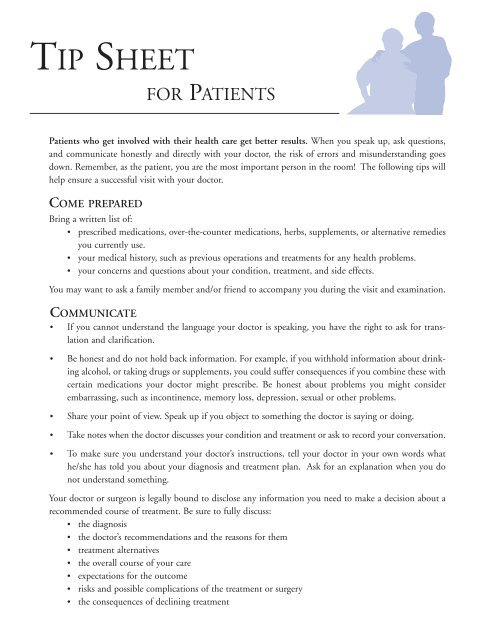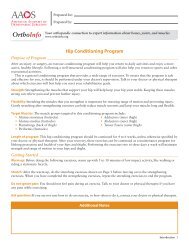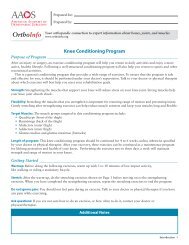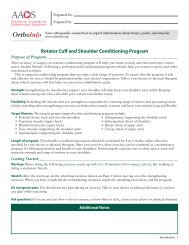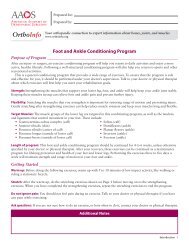Patient Tip Sheet (PDF)
Patient Tip Sheet (PDF)
Patient Tip Sheet (PDF)
You also want an ePaper? Increase the reach of your titles
YUMPU automatically turns print PDFs into web optimized ePapers that Google loves.
TIP SHEET<br />
FOR PATIENTS<br />
<strong>Patient</strong>s who get involved with their health care get better results. When you speak up, ask questions,<br />
and communicate honestly and directly with your doctor, the risk of errors and misunderstanding goes<br />
down. Remember, as the patient, you are the most important person in the room! The following tips will<br />
help ensure a successful visit with your doctor.<br />
COME PREPARED<br />
Bring a written list of:<br />
• prescribed medications, over-the-counter medications, herbs, supplements, or alternative remedies<br />
you currently use.<br />
• your medical history, such as previous operations and treatments for any health problems.<br />
• your concerns and questions about your condition, treatment, and side effects.<br />
You may want to ask a family member and/or friend to accompany you during the visit and examination.<br />
COMMUNICATE<br />
• If you cannot understand the language your doctor is speaking, you have the right to ask for translation<br />
and clarification.<br />
• Be honest and do not hold back information. For example, if you withhold information about drinking<br />
alcohol, or taking drugs or supplements, you could suffer consequences if you combine these with<br />
certain medications your doctor might prescribe. Be honest about problems you might consider<br />
embarrassing, such as incontinence, memory loss, depression, sexual or other problems.<br />
• Share your point of view. Speak up if you object to something the doctor is saying or doing.<br />
• Take notes when the doctor discusses your condition and treatment or ask to record your conversation.<br />
• To make sure you understand your doctor’s instructions, tell your doctor in your own words what<br />
he/she has told you about your diagnosis and treatment plan. Ask for an explanation when you do<br />
not understand something.<br />
Your doctor or surgeon is legally bound to disclose any information you need to make a decision about a<br />
recommended course of treatment. Be sure to fully discuss:<br />
• the diagnosis<br />
• the doctor’s recommendations and the reasons for them<br />
• treatment alternatives<br />
• the overall course of your care<br />
• expectations for the outcome<br />
• risks and possible complications of the treatment or surgery<br />
• the consequences of declining treatment
• If the doctor describes an anatomic problem or a procedure, ask to see a drawing, picture or model to<br />
further understand the diagnosis and the procedure.<br />
• Ask for specific instructions for taking a prescribed medication and the possible side effects.<br />
• Ask what effect the treatment might have on your daily activities and what you can expect regarding<br />
your recovery. During your recovery, be honest about how you’re feeling, the pain you might be experiencing,<br />
and any other issues that concern you.<br />
• Ask for brochures, literature or online resources that clearly describe your diagnosis, medical tests and<br />
treatment.<br />
• Be open about your personal, cultural, spiritual, or religious issues.<br />
• Discuss your spiritual or religious concerns in regards to your treatment. Certain religious restrictions<br />
may have an impact on your medical treatment and hospitalization.<br />
• Tell your doctor if you have certain cultural needs or preferences as they relate to your interaction with<br />
health care professionals, your treatment plan, and your recovery.<br />
• Tell your doctor if you have any superstitions or other beliefs that may impact your treatment.<br />
• If you have religious objections to the use of blood products or blood transfusions, tell your doctor.<br />
• If you have dietary requirements or restrictions, inform your doctor and the hospital staff. Examples<br />
include kosher dietary laws, restrictions on alcohol or other restricted substances in medications, and<br />
religious fasting.<br />
• Tell the doctor and/or staff if you are uncomfortable being examined by or in the presence of a male<br />
or female, or if you have personal restrictions on what parts of your body should remain covered.<br />
• Inform the doctor and staff about your needs for privacy. For example, during your stay in a hospital<br />
room, you can request a screen to shield you and a sign asking staff members to knock and ask permission<br />
before entering your room.<br />
FOR MORE INFORMATION<br />
For information about orthopaedic conditions and treatment options, visit “Your Orthopaedic<br />
Connection” at AAOS: www.orthoinfo.org/diversity.


